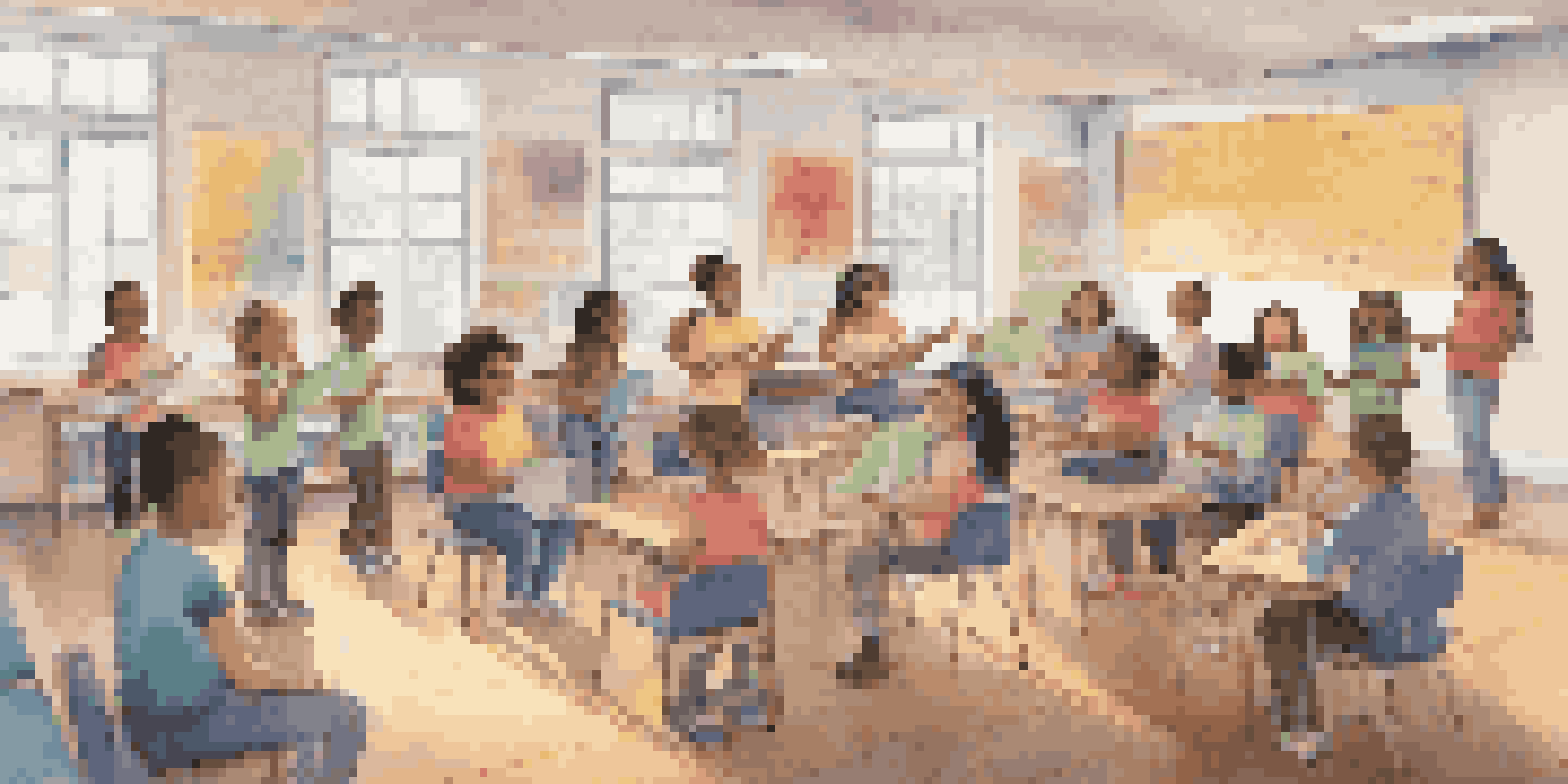Singing Techniques for Special Needs: Tailored Approaches

Understanding the Unique Needs of Singers with Disabilities
Every individual has unique abilities and challenges, especially those with special needs. When it comes to singing, understanding these challenges is crucial. For instance, someone with a hearing impairment may require visual cues to grasp pitch and rhythm.
Music can change the world because it can change people.
It's essential to recognize that the approach to singing should be as diverse as the individuals themselves. Tailoring techniques not only makes lessons more effective but also boosts confidence. This personalized focus allows singers to express themselves authentically.
By learning about specific disabilities—whether they involve physical, cognitive, or emotional aspects—teachers can develop strategies that resonate with their students. This understanding forms the foundation for a supportive and fruitful learning environment.
Creating a Comfortable and Supportive Environment
A welcoming environment can significantly impact a singer's willingness to participate. When individuals feel safe and accepted, they're more likely to express themselves freely. This sense of belonging encourages creativity and exploration in their singing journey.

Incorporating familiar and calming elements, like soft lighting or favorite colors, can help reduce anxiety. Moreover, using positive reinforcement helps build trust between the instructor and the student. This bond allows for open communication, which is vital for effective learning.
Tailored Techniques Boost Confidence
Personalized singing techniques cater to individual needs, enhancing both learning effectiveness and self-expression.
Creating a supportive atmosphere isn't just about physical space; it's also about emotional support. Encouragement and understanding can make a world of difference, empowering individuals to take risks and embrace their unique voices.
Incorporating Visual Aids and Technology
Visual aids can transform singing lessons, especially for those who benefit from seeing rather than hearing. Tools like color-coded sheet music or visual pitch guides can simplify complex concepts. By providing a visual representation of music, students can more easily grasp the structure and flow of a song.
The beautiful thing about learning is that no one can take it away from you.
Technology plays a significant role in enhancing learning experiences. Apps that provide instant feedback on pitch accuracy or rhythm can help singers refine their skills at their own pace. This integration of technology makes learning more interactive and engaging.
Using visual and technological tools not only aids understanding but also fosters independence. Singers can practice on their own, reinforcing their skills while building confidence away from the instructor's guidance.
Adapting Vocal Techniques for Individual Needs
Vocal techniques must be adaptable to suit each singer's unique requirements. For instance, someone with a physical disability might need modified breathing exercises to accommodate their condition. These adaptations ensure that every singer can participate without feeling excluded.
It's important to focus on methods that promote vocal health and sustainability. Techniques like gentle warm-ups and proper hydration can help singers maintain their voices, regardless of their starting point. This emphasis on health encourages long-term engagement with singing.
Supportive Environments Foster Growth
Creating a comfortable and encouraging atmosphere empowers singers to explore their voices and take risks.
Tailoring vocal techniques also means respecting the singer's comfort level. Gradually introducing challenges allows singers to grow without feeling overwhelmed, fostering a love for singing that can last a lifetime.
Using Music as a Therapeutic Tool
Music has profound therapeutic benefits, making it an excellent tool for individuals with special needs. Engaging with music can improve mood, reduce anxiety, and enhance social skills. Singing, in particular, allows for emotional expression, providing an outlet for feelings that may be difficult to verbalize.
Incorporating therapeutic music practices can also improve communication skills. For instance, group singing activities can foster collaboration and enhance social interactions among participants. This shared experience strengthens bonds and builds a sense of community.
Utilizing music as a therapeutic tool not only aids in skill development but also promotes mental well-being. The joy of making music together can lead to increased self-esteem and a sense of accomplishment.
Encouraging Group Singing for Social Connection
Group singing can be a powerful way to foster social connections among singers with special needs. Participating in a choir or group setting creates a sense of belonging and shared purpose. This communal experience can enhance motivation and enjoyment in the learning process.
Collaborative singing encourages teamwork and communication, essential skills for personal development. As individuals harmonize and blend their voices, they learn to listen to others and adjust their singing accordingly. This practice cultivates empathy and understanding in a supportive environment.
Group Singing Enhances Connection
Participating in group singing fosters social bonds and collaboration, enriching the overall experience for singers.
Moreover, group singing can help reduce feelings of isolation. By connecting with others through music, singers can forge friendships that extend beyond the rehearsal room, enriching their lives in numerous ways.
Celebrating Progress and Achievements
Recognizing and celebrating progress is crucial for fostering motivation in singers with special needs. Each small achievement, whether mastering a new song or improving vocal technique, deserves acknowledgment. Celebrations can range from verbal praise to performances that showcase their hard work.
Creating a culture of celebration not only boosts confidence but also reinforces the joy of singing. When singers see their efforts rewarded, they are more likely to stay engaged and continue pursuing their passion. This positive feedback loop encourages ongoing growth and exploration.

Celebrating achievements also strengthens the bond between instructors and singers. When instructors take the time to recognize individual milestones, it shows that they genuinely care about their students’ journeys, creating a nurturing and supportive learning environment.